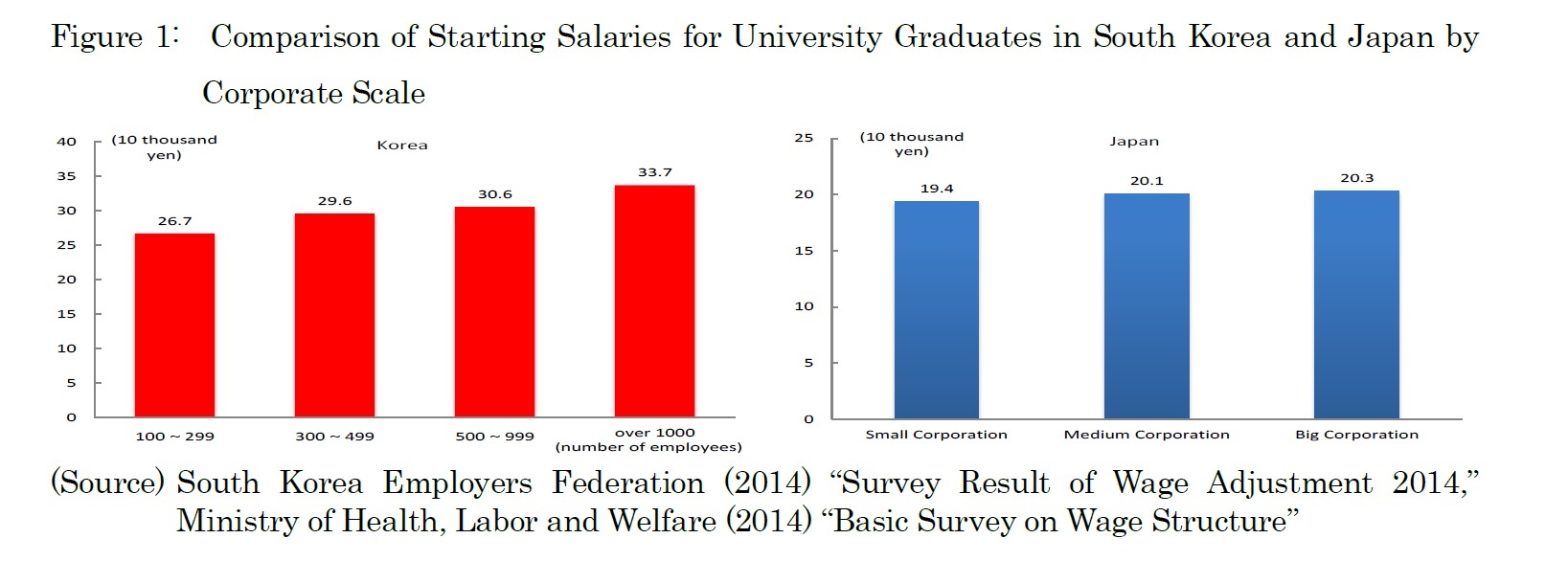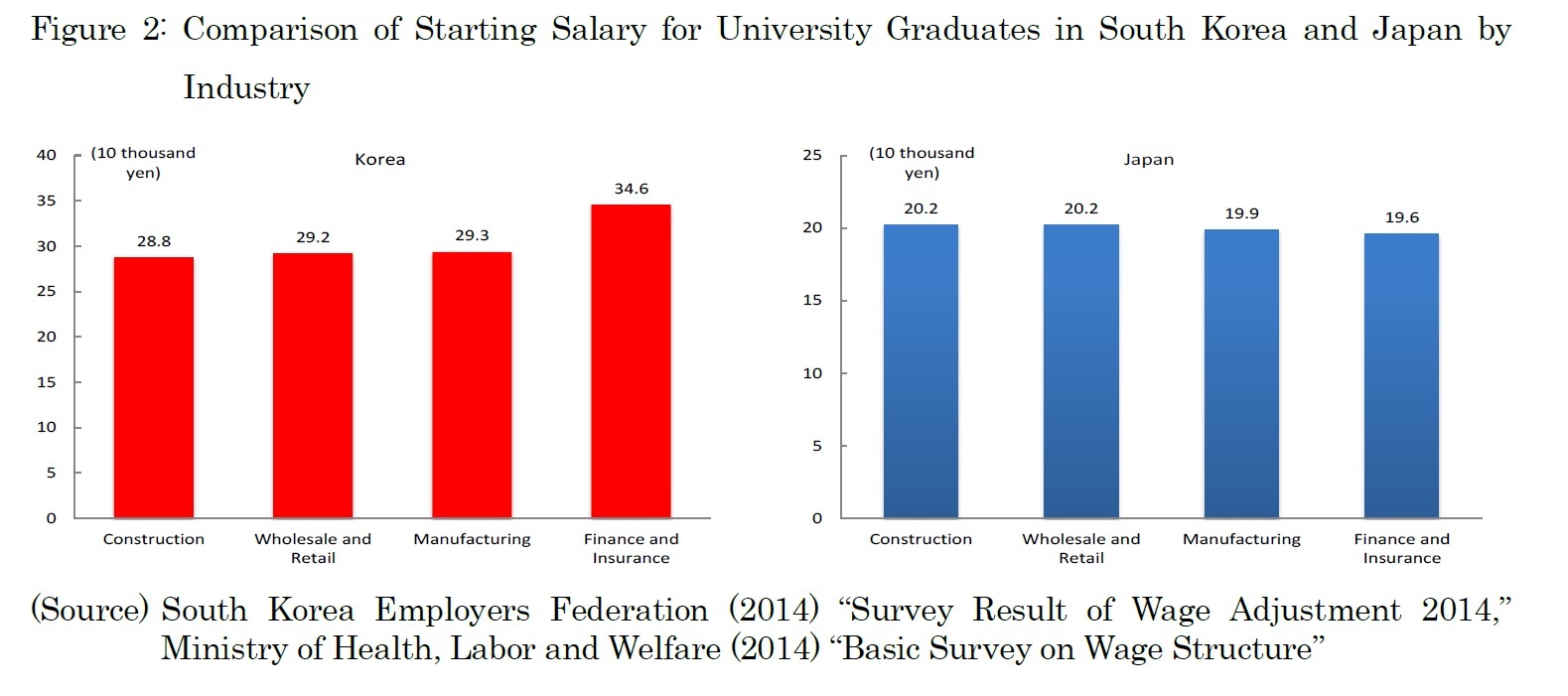- NLI Research Institute >
- Corporate management >
- Comparison between South Korea and Japan (1): Starting Salary for New University Graduates - Is the Starting Salary for University Graduates in South Korea Higher than in Japan? -
Comparison between South Korea and Japan (1): Starting Salary for New University Graduates - Is the Starting Salary for University Graduates in South Korea Higher than in Japan? -
Social Improvement and Life Design Research Department Research fellow Kim Myoungjung
Font size
- S
- M
- L
Why are these phenomena observed? First of all, abrupt change in the foreign exchange rate is considered as the most fundamental factor. As of June 11, 2015, the foreign exchange rate is 0.11 yen per won, whereas it was 0.07 yen per won in June 11, 2012. Recalculated based on the foreign exchange rate in 2012, the average starting salary for university graduates in South Korea in 2014 decreased from 306 thousand yen to 195 thousand yen. Hence, the present average starting wage for the South Korean university graduates is overvalued due to the influence of the strong won.
For another factor, the average starting salary for university graduates announced by KEF includes bonuses. That is, the average starting salary in South Korea adds up the bonuses and salaries for twelve months, and is recalculated on a monthly basis. Thus, it is not reasonable to compare the South Korean figure with the Japanese which does not include bonuses, and it is obvious the Japanese salary will be higher than the present figure if bonuses are included.
In addition, it is hard to say the average figure for South Korea above does not represent the starting salary for university graduates because the average in South Korea differs greatly by corporation. The average salary of corporations with 1,000 employees or more is 3.066 million won (337 thousand yen), while that of corporations which have 100 to 299 employees is 2.429 million won (267 thousand yen); it means there is a difference of 637,000 won (70 thousand yen) between the two groups in South Korea. Meanwhile, in Japan, the gap between the large corporations (203 thousand yen) and the small (194 thousand yen) is only 9 thousand yen.
Furthermore, there is little difference among industries in Japan, while there is a great difference (526 thousand won, 58 thousand yen) between the finance and insurance industry (3.141 million won, 346 thousand yen) and construction industry (2.615 million won, 288 thousand yen) in South Korea.
Why is the average starting salary for university graduates in South Korea different by the scale of corporations or the industry? First of all, as mentioned above, the average starting payment for university graduates in South Korea includes bonuses, and more profitable corporations provide higher bonuses. Secondly, labor unions in South Korea take a firm stand while those in Japanese do not. Labor unions which are more prevalent in the large corporations require higher starting salaries that reflect corporate performance than the small and medium enterprises; this possibly creates a gap in the starting salary average between large corporations and the small and medium enterprises that do not have labor unions. Thirdly, large corporations set high starting salaries to attract the most capable human resources, and the labor supply is focused on major firms.
As explained above, it seems difficult to regard the average starting salary for recent university graduates in South Korea as the representative figure like the Japanese one, because salaries in South Korea differ significantly depending on the scale of corporations and the industry. Moreover, as the average in South Korea is based on regular employees and does not include the payment for non-regular employees who account for a little less than 40% of the new university graduates, the wage gap among the recent university graduates would be widened significantly. In Japan, there is also a big wage gap between the large corporations and small and medium enterprises for starting salary; however, the gap at the starting point is not as significant as it is in South Korea.
The large variances in the starting point(s) of the salary system can be a factor that disrupts a sound social system by stratifying the gap within society as a whole in the future. The South Korean government needs to strengthen support measures for small and medium sized enterprises and nurture the competitiveness of these enterprises. This should offer a solution for reducing the gap in the starting salary for new university graduates and the wage between large corporations and small and medium enterprises.
We should pay attention to the actions and measures of the South Korean and Japanese governments regarding wage gap issues for the younger generation, including the starting salary for university graduates.
1 Foreign exchange rate 1 won = 0.11 yen (as of June 11, 2015)

Social Improvement and Life Design Research Department Research fellow
Kim Myoungjung
Research field
03-3512-1878
レポート紹介
-
研究領域
-
経済
-
金融・為替
-
資産運用・資産形成
-
年金
-
社会保障制度
-
保険
-
不動産
-
経営・ビジネス
-
暮らし
-
ジェロントロジー(高齢社会総合研究)
-
医療・介護・健康・ヘルスケア
-
政策提言
-
-
注目テーマ・キーワード
-
統計・指標・重要イベント
-
媒体
- アクセスランキング



















